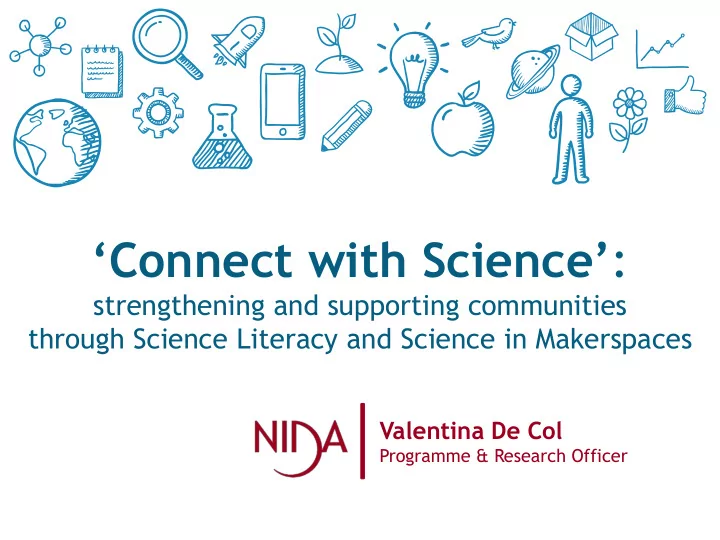

‘Connect with Science’ : strengthening and supporting communities through Science Literacy and Science in Makerspaces Valentina De Col Programme & Research Officer
Planetary Health The health of human civilization and the state of the natural systems on which it depends The Rockefeller Foundation – Lancet Commission on Planetary Health, 2015 Planetary health depends on informed citizens
Understanding issues: global warming Source: nasa.gov Fossil fuels Deforestation Agriculture
Understanding issues: loss of biodiversity Climate change Deforestation and habitat loss Invasive species Pollution Overexploitation
Understanding issues: implications of genetic research Animals Humans Plants
Understanding issues: maternal health Every day ~ 830 women die from preventable causes related to pregnancy and childbirth 99% in developing countries Higher in women living in rural areas and among poorer communities Source: WHO, 2016
Understanding issues: there are many others… agronomy, astronomy, epidemiology, marine ecology, medicine, water quality and more...
Essential for personal, community and global involvement
Network for Information and Digital Access NGO based in Oxford (UK) Over 8,500 network members across 76 countries MISSION Promote and stimulate access and effective utilisation of information and knowledge MAIN FOCUS Public access to information and services which provide it
Network for Information and Digital Access Since inception, NIDA works through collaboration, in response to request, supporting, strengthening and advising information and knowledge activities, including: - research - local content - impact assessment Specialist fields of information policies and sector assessment added in 2007
nida-net.org 2014-2015 Requests in the field of science & technology led to the programme ‘Connect with Science’; one of the first activities of which was a Landscape Survey of Science Literacy in Developing Countries
nida-net.org ‘Connect with Science’ includes two main strands at the moment Science Literacy Science in Makerspaces
‘Connect with Science’ Science Literacy Science literacy relates to the ability to: - read and write - think scientifically - use scientific knowledge and processes to both understand the world around us and to participate in decisions that affect it
nida-net.org Science Literacy could have increased beneficial impact globally, and especially in developing countries: - food security - food safety - disease prevention - maternal health - water management - safety and sanitation in urban environments - agriculture and rural development - diet and nutrition and more…
‘Connect with Science’ Better understanding leads people to respond better to the challenges around them
‘Connect with Science’ Science in Makerspaces Community-operated work spaces where people with common interests can meet, socialize, innovate and collaborate
‘Connect with Science’ Science in Makerspaces Hands-on experimentation and innovation in local public spaces can contribute to the sharing of innovative experiences and developing skills in the application of scientific and technologic understanding
‘Connect with Science’ Combining Science Literacy with exploration in Makerspaces Prosthetics Robotics Mud battery Drone for vaccine delivery
nida-net.org ‘Connect with Science’ receives recommendations and collects examples of recent or ongoing practical activities that have the potential to be adapted to a range of different cultures and contexts
nida-net.org NIDA is also able to support pilot projects e.g. the Maternal Health literacy pilot project in Kochi, Kerala (India): address maternal health problems of women living in urban slum areas of Kochi
nida-net.org Nutrition Sensitive Literacy (NSL) pilot project (Nepal): to foster the literacy skills of children and increase knowledge of nutrition and health
nida-net.org Scientific Animations Without Borders (SAWBO) (USA/global): provide access to health and agricultural information to low literate learners
nida-net.org Namib Desert Environmental Education Trust (NaDEET) (Namibia/national): fostering Education for Sustainable Development (ESD) in Namibia
nida-net.org Cimaza (Belgium/global): informing and educating the general public about the importance of immunization, vaccine safety, science behind virus infections and diseases
nida-net.org Bus ConCiencia (Bus "With-Science") (Chile/national): enhancing the learning of Science and Technology, through inspiring and facilitating easily replicable scientific experiences
nida-net.org 'La main à la pâte' Foundation (France/global): improving the quality of science and technology teaching in primary and secondary education
nida-net.org EEF & DFRobot Kit pilot project (China): increasing Maker experience in Arduino projects, providing more access to Maker activity and enabling hands-on projects
nida-net.org Hardwarethon (Costa Rica, Nicaragua): developing new technological ideas, projects and prototypes able to generate a culture of innovation
‘Connect with Science’ Contributing to Science Literacy
‘Connect with Science’ Contributing to sustainable development Wind turbine Solar cooker Water filter Solar compressor
‘Connect with Science’ Protecting and conserving global resources Atmosphere, water, land, minerals, vegetation, crops, animal life, biodiversity, ecosystems,…
Forthcoming research The impact of Science Literacy delivery methods - what works?
THANKS! Valentina De Col - valentina.decol@nida-net.org @nidanet.org nida-net.org @NIDA_net
Recommend
More recommend